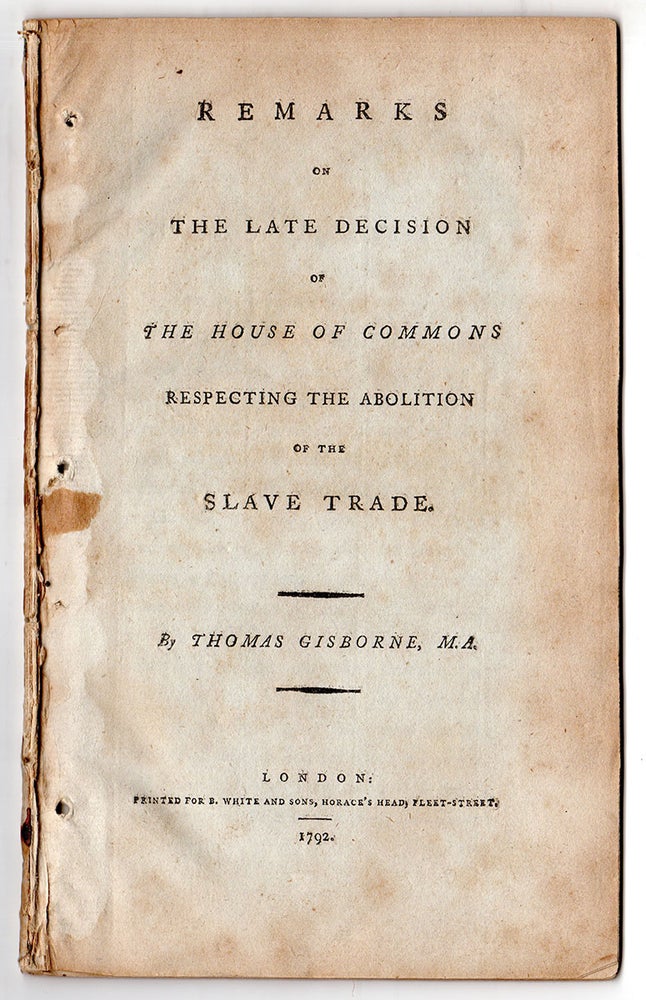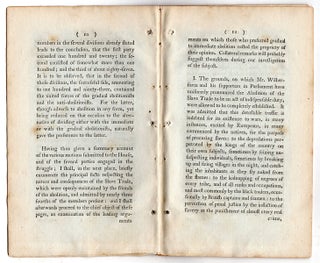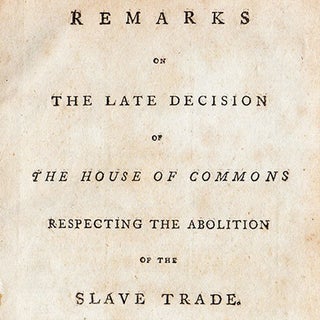Remarks on the Late Decision of the House of Commons Respecting the Abolition of the Slave Trade.
London: Printed for B. White and Sons, Horace’s head, Fleet-street, 1792. 12mo pamphlet (8.5” x 5.25”), lacks wrappers, removed from samelband. 49 pp. CONDITION: Good, some wear to title-page and terminal leaf, small piece of brown paper adhered to inner edge of title-page, stab holes at spine, old ink accession number stamped in margin of p. 3, contents generally clean with a touch of foxing here and there. A powerful account of William Wilberforce’s introduction of the motion to immediately abolish the English slave trade in the British House of Commons, and a response to objections and counter-proposals, including “gradual abolition.” English Anglican priest, poet, and natural philosopher Thomas Gisborne (1758–1846) was a central figure in the Clapham Sect, which fought for the abolition of the English slave trade and whose members included William Wilberforce and Gisborne’s brother-in-law Thomas Babington. Gisborne was an intimate friend of a number of leaders of the movement. He wrote some thirteen books, whose topics embraced moral philosophy, abolitionism, the duties of men in middle and upper classes, the responsibilities of women, poetry, theology, and ecclesiology. The present text begins with a dedication to Wilberforce, who pressed Britain’s House of Commons—only a few years before this pamphlet’s publication—to concur with him “that the Slave Trade ought to be abolished.” Gisborne writes: “[Wilberforce] avowed in the most energetic terms, his own conviction that, on every principle, not only of humanity, of justice, and of religion, but of sound policy likewise, the Slave Trade ought to be abolished instantly.” He proceeds to describe the following motions submitted to the House of Commons in response to Wilberforce’s motion and the parties engaged in the legislative struggle. The three positions on the issue consist of friends to abolition—immediate and gradual—and those who are enemies to both. In response to Wilberforce’s motion, a majority of 230 to eighty-five resolve that “the Slave Trade ought to be gradually abolished.” Gisborne then enumerates at-length the principal facts concerning the nature and consequences of the slave trade, as averred by the abolitionists: It was admitted that this detestable traffic is indebted for its existence to wars, in many instances, excited by Europeans, in many commenced by the natives, for the purpose of procuring slaves: to the depredations perpetrated by the kings of the country on their own subjects, sometimes seizing unsuspecting individuals, sometimes by breaking up and firing villages in the night, and catching the inhabitants as they fly naked from the flames: to the kidnapping of negroes of every tribe, and of all ranks and occupations, and most commonly by the black traders, occasionally by British captains and seamen: to the perversion of penal justice by the infliction of slavery as the punishment of almost every real crime, however trifling … The miserable condition into which Africa is sunk by the prevalence of such a system of atrocious enormities was equally uncontradicted. He concludes by urging legislators to reject the Bill for “gradual abolition”: I earnestly beg every member of the Legislature to pause for a moment, and before he gives his assent to a Bill for that purpose, to make the case of one of those ten thousand Negroes, whose liberty and happiness he is called upon to vote away in cold blood, fairly and impartially his own. Let him do as he would be done by…Let him ask himself…whether, if he were the Negro, he should think those reasons justified his being enslaved. An important argument bolstering the British abolitionist movement. REFERENCES: Mortenson, Terry. “Thomas Gisborne (1758–1846)” at Answers In Genesis online.
Item #5534
Price: $2,250.00




